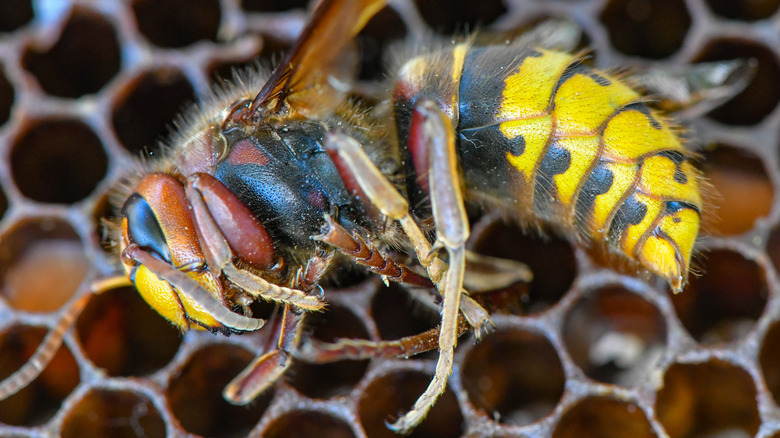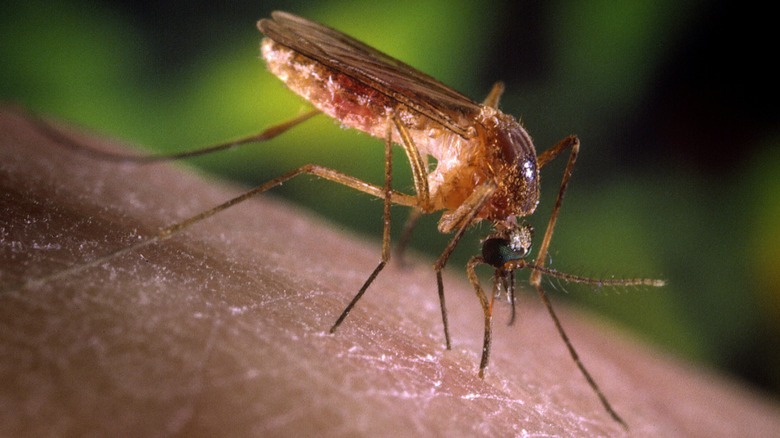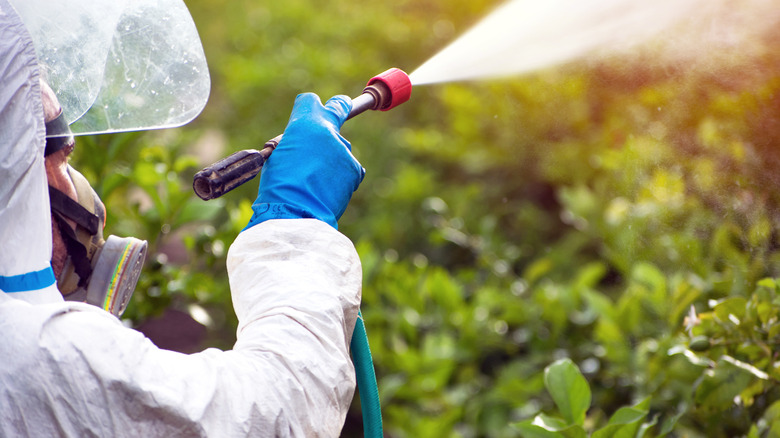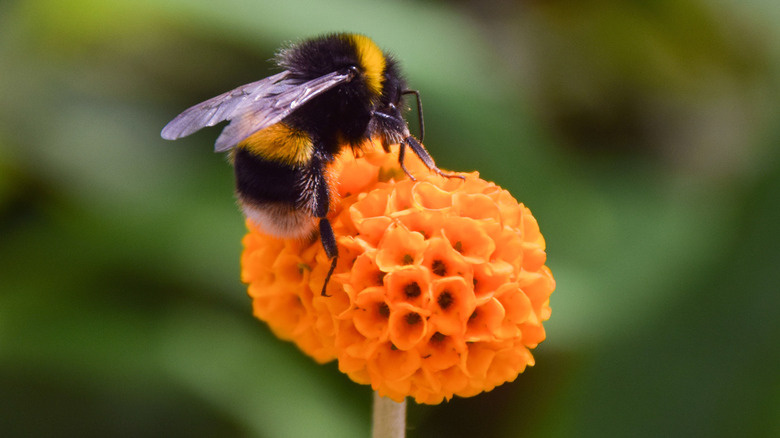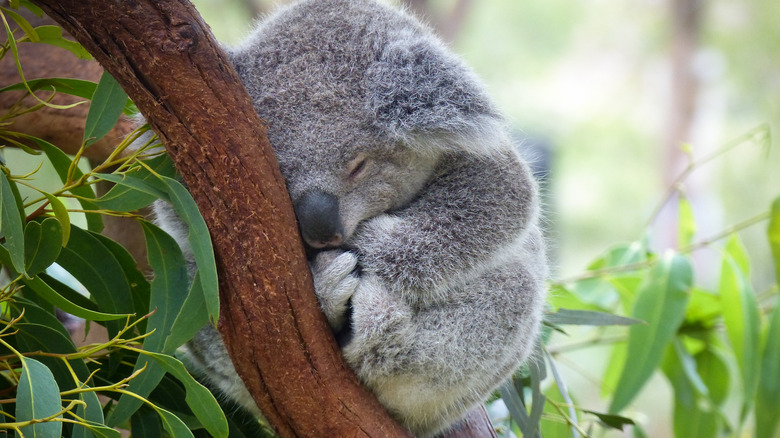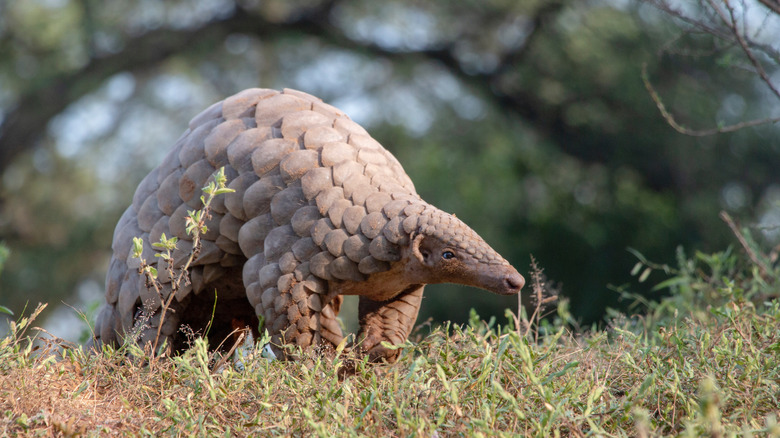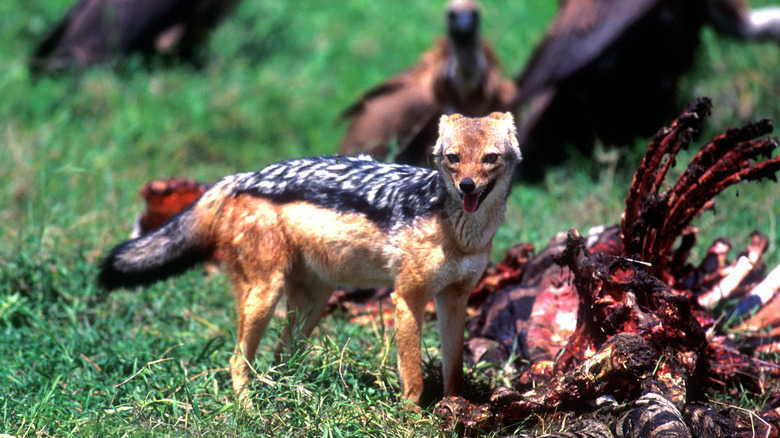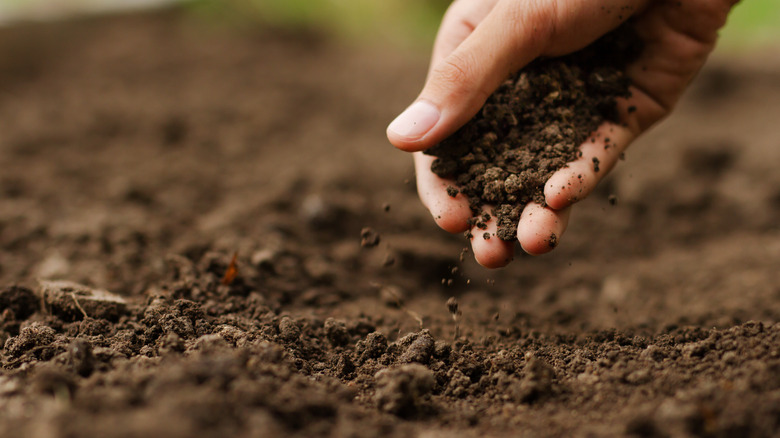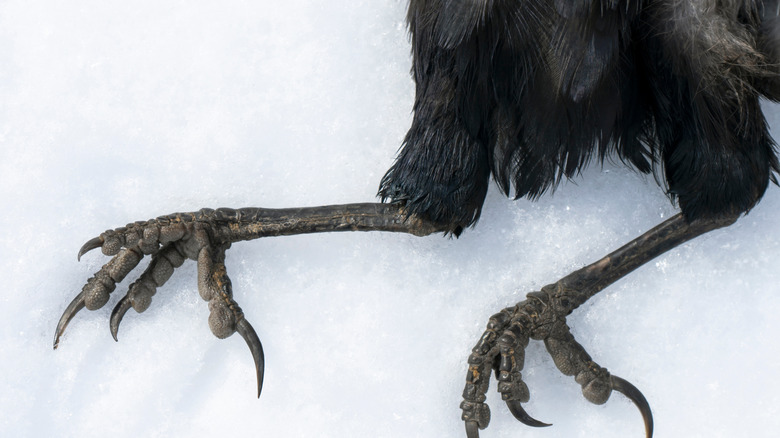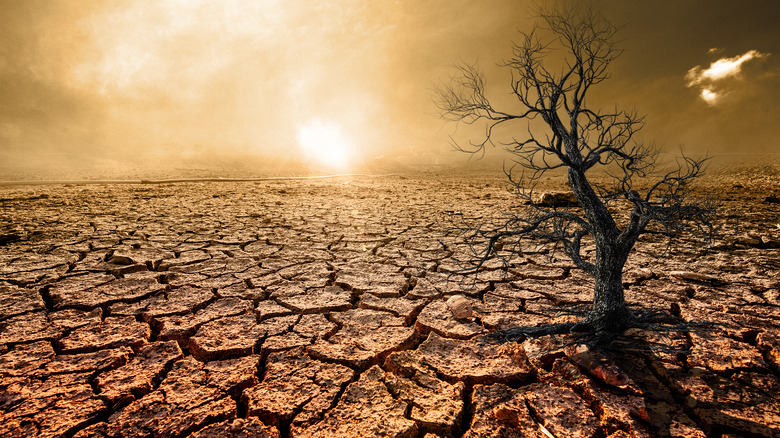What Would Happen If All The Insects Died?
Here's the cold reality about being an insect in man's world: Unless you're a lovely butterfly or a luminous firefly, not a lot of folks are going to appreciate your existence. Some hear the word "insect" and immediately think of them as either nuisances, agricultural pests, or disease vectors. Even the way people communicate reveals a bit about humanity's disdain for these arthropods. The term "insect" is sometimes used to describe an insignificant person, and when an object or event causes someone discomfort or irritation, people say that it "bugs" them.
While it's true that coexisting with insects can be occasionally challenging, their capacity to ruin picnics, decimate crops, or cause various illnesses shouldn't be enough reason for anyone to write them off as a whole. In fact, pretty much every living thing on the planet would suffer if all insects were to disappear one day.
It's important to note that despite what so many doomsday-style headlines and stories have said, the chances of all insects going extinct are extremely slim. After all, scientists say there are about 10 quintillion (yep, 19 zeroes) insects on Earth. Nevertheless, even the loss of just one type of insect can have devastating consequences, no matter what the benefits of their extermination may look like. Here's what would happen to the world if every single one of these six-legged critters suddenly ceased to exist.
Insect-borne diseases would stop spreading
According to the World Health Organization, over 700,000 people die of dengue, malaria, and other diseases passed on to them by disease-carrying organisms, or vectors. These vectors transmit diseases from the bacteria, parasites, or viruses that they have inside their bodies.
When it comes to vector-borne diseases, insects tend to be absolute champions at spreading them. More often than not, it's the ones that suck blood from their victims that end up being vectors: If they happen to choose an infected target, they'd take in the pathogens from their victim's bloodstream, inadvertently infecting a different host the next time they feed. Thus, one of the few benefits of living in a world without insects would be the near-complete eradication — if not total annihilation — of diseases that they pass around.
Ergo, without bloodsucking mosquitoes, yellow fever, Zika, malaria, and dengue could quickly become a thing of the past. Without lice, humans wouldn't have to worry much about typhus fever. Ridding the world of tsetse flies would likely rid the world of sleeping sickness (African trypanosomiasis) which, despite its relatively harmless-sounding name, is actually one nasty customer: It leaves the patient in a zombie-like state, and the outcomes are either death or permanent brain damage (via BBC News).
There would be no need for insecticides
In a 2019 study, researchers found that the world uses about 2 million tonnes of pesticides every year — and that the United States holds the second-biggest slice of this pie. And while pesticides (including insecticides) play an important role in making sure that there's enough food for everyone, too much of it can put nature, wildlife, and even ourselves at risk.
For instance, according to statistics from the United States' National Academy of Sciences, 4,000 to 20,000 cancer cases each year can be attributed to the small quantities of residual pesticides that fall under what's legally allowable for food to contain (via ChemEurope). Pesticides also have a harmful effect on soil health. A 2021 study found that in 70 percent of experiments with pesticides, the organisms that play significant roles in keeping soil healthy were negatively affected. And because such impacts aren't normally included or considered in government safety assessment guidelines, the findings highlighted the need for an immediate change in the way pesticides regulate pesticides.
Does this list look awesome to you so far? In might be tempting to think that the absence of insects would make the world a much better place. Sadly, this is as good as it gets.
Many plants would die out
Among the 391,000 known species of plants on Earth, about 94% are angiosperms, or flowering plants, according to a 2016 article on Mongabay. And out of all those species, around 88% depend on animals for pollination, based on calculations in a 2011 study. The plants that are involved in vegetable, fruit, medicine, and textile-related fiber production are especially dependent on the best and most successful animal pollinators around: insects (via the Australian Museum).
Insect pollinators are so good at what they do because they have the ability to fly and are able to go from plant to plant in a jiffy. Plants get better results from these insects carrying their pollen than from just leaving pollen dispersal to chance. Part of the reason why insects are such efficient pollinators is that plants have evolved to give them ample motivation: Insects obtain food from flowers and end up scattering pollen grains as they skip around in search of their next meal.
Thus, a world without bees, butterflies, wasps, and other pollinators would mean extinction for nearly all of the world's animal-pollinated flowering plants. And if you recall your basic science lessons, if even just one part of the food chain disappears, everything goes to hell pretty quickly.
The world would say goodbye to honey, chocolate, and coffee
The fact that animal pollinators, particularly insect pollinators, are critical for food production can't be understated. For starters, three fourths of the food humans obtain from plants are made possible by butterflies, birds, bats, and other pollinators (via the United Nations Food and Agriculture Organization). Furthermore, about 33 percent of what humans eat worldwide come from plants reliant on bees — yes, just a single type of insect — for pollination (via the Australian Museum).
Unfortunately, the FAO has reported a "worrisome decline" in pollinator populations, particularly insects. And when bees, butterflies, and other insect pollinators disappear from the planet, so will some of humanity's favorite foods. Honey is perhaps the most obvious casualty here: Western honeybees alone account for 1.6 million tonnes of the world's annual honey production.
Can you imagine a world without chocolate and coffee? That's what the world will be like without insects, according to Pollinator.org's list. Almonds, apples, avocados, bananas, grapes, strawberries, and tomatoes are just a few of the many other food crops that will go the way of the dinosaurs when insects are no longer around, as well as various plant-based fats and oils essential for food preparation (via the United States Department of Agriculture).
Plant-eating animals would go extinct
Unsurprisingly, if the majority of plants on Earth die out, the animals that directly depend on them will quickly follow. (The operative word here is "directly," but these disappearances would still have devastating consequences on all segments of the global food web.)
LiveScience defines the word "herbivore" as "an animal or insect that only eats vegetation, such as grasses, fruits, leaves, vegetables, roots and bulbs." Interestingly, parasitic plants that sap nutrients from other plants due to their inability to make their own food are also described as herbivorous. Herbivores are scattered across the world's various ecosystems, ensuring a healthy balance by serving as agents that prevent plants from growing too much and completely taking over their environment (via National Geographic). Herbivores can be further divided according to what they eat: nectarivores like bees consume nectar, folivores like caterpillars dine on leaves, and frugivores like fruit flies prefer the reproductive tissues of plants.
To be able to handle their plant-based diets, herbivores' physical traits and organ systems evolved specifically to process plant matter and absorb nutrients from their leafy lunches. Admittedly, the distinction between plant-eater and meat-eater isn't as clear-cut as beginner-level biology lessons depict: Herbivores like deer occasionally partake in animal flesh, possibly for nutrition-related reasons (via Slate). However, they're unlikely to ever be able to switch to a pure-meat diet — and besides, it's not like meat-eaters would be safe from the consequences of insect extinction, anyway.
Insect-eating animals would die off
Insectivores would certainly have a pretty hard time adjusting if their main source of food were to suddenly vanish. And as it turns out, there are plenty of species in the animal kingdom that depend on all sorts of insects in order to meet their primary nutritional requirements.
Arachnids would likely be at the top of many people's lists of insectivores. It would be hard to find someone who hasn't observed a fly or moth stuck on a spider's web. Scorpions are also partially insectivorous (via World Atlas), as well as a handful of other arachnid species. Amphibians like frogs and toads also like snacking on insects, as do many of the 2,700 species of lizards all over the planet. There are also many mammalian insectivores, like pangolins, anteaters, and bats. These winged warm-bloods in particular have well-documented insect-eating tendencies: The U.S. Geological Survey reveals that 42 out of the 45 known species of bats in the United States hunt and feed on insects.
Protein-rich insects are also an essential food source for birds and their hatchlings (via The Spruce). Many avian species (often small birds of prey) diversify their diets as they grow older but still remain partially insectivorous. However, there are some birds that mainly eat insects even as adults, such as bluebirds, hummingbirds (though they also eat nectar), nighthawks, swallows, warblers, and woodpeckers.
Meat-eaters would suffer, too
As LiveScience explains, it's important to understand that nearly all of the planet's living organisms directly or indirectly depend on the Sun's light to live. Hence, as stated earlier, whether it's a plant capable of photosynthesis, an herbivore that takes a bite out of its leaves, or a carnivore that ends up having the herbivore for supper, the disappearance of just one part of the food web will inevitably ruin everything.
A 2019 study that studied over 1,000 species of still-existing animals found that 63 percent of them were carnivores, and 3 percent were omnivorous. While this obviously does not represent the entirety of all animal species on Earth, it gives a pretty decent picture of just how many animals directly depend on other animals for food. Much like how plant-eaters can't just switch to an all-meat diet, carnivores can't just decide to suddenly go vegan: Their highly specialized digestive systems simply can't handle the tough cell walls of grass and leaves.
In other words, taking insects out of the global equation will eventually mean certain doom for the world's major carnivore groups. Canines, felines, bears, seals, procyonids such as racoons, mustelids like weasels and otters, and hyenas will starve to death. And as you've probably realized by now, these ripple effects would eventually affect omnivores, like humans.
Humanity would synthesize, consume, and pollute a whole lot more
Food shortage is far from being the only terrible impact of global insect extermination on humanity, though. Without pollinators, the world will lose its supply of natural cotton and flax, which are critical for the textile industries. Additionally, the larva or caterpillar form of the domestic silk moth is the world's main source of silk, a highly valued textile that has been part of society since humanity learned how to properly harness it (via Business Insider).
Without these natural fibers, the textile industry will be forced to rely solely on synthetic fibers. Through a chemical process called polymerization, petroleum and other chemicals become synthetic fibers like acrylic, nylon, and polyester, which are used in a wide variety of applications (via ScienceDirect).
While this can solve the supply problem, it won't be without drastic consequences. For starters, synthetic fibers can irritate the skin and can also cause diseases (via Owlcation). Furthermore, the impact of synthetic fiber production on global pollution levels is nothing to scoff at: According to the Indiana Environmental Reporter, 35% of the 1.5 million tonnes of microplastics that get dumped in the ocean each year come from synthetic fibers. (And yes, these microplastics can also end up in drinking water and agricultural waterways.) Meanwhile, Forbes reports that the world's annual polyester fiber production consumes almost 70 million barrels of oil — and that these products will stay on the planet as nonbiodegradable waste for more than two centuries.
The global economy would crash
If insects were to die out, the devastating effects wouldn't be limited to food and textile production. The worldwide economy would inevitably take a massive hit, too. According to the United States Forest Service, crop pollinators in the country are worth about $10 billion every year; worldwide, that number shoots up to around $3 trillion. Honey alone is at the center of a $9.21 billion global market, while the global chocolate and coffee industries are valued at $208.15 billion and $102.02 billion, respectively.
Lac scale insects produce a resinous secretion called lac. Each year, the world (mostly India) gathers roughly 40 million pounds of it, as it is an important component of insulators, inks, wood finishes, cloth and leather dyes, and other products (via the Smithsonian Institution). Scale insects also produce an assortment of raw materials for dyes; the most well-known example is perhaps the cochineal scale insect, which served as the world's best source of red dye for hundreds of years (via FlipScience). There's also tannin, an important compound for tanning hides and producing permanent inks, which is sourced from insect galls (via the Smithsonian Institution). Bees' honeycombs also produce beeswax, which manufacturers use in candles, polishes, and various cosmetic products.
Worldwide soil quality would suffer
The mere existence of insects and other arthropods helps keep the world's soil healthy enough for crops to grow in the first place. As World Atlas explains, the holes that insects create as they dig through the soil enable oxygen, water, and an assortment of nutrients to make their way to plants' roots. Even fecal matter from insects can greatly contribute to soil health: The lowly cockroach, hated all over the world for its appearance and reputation as a household pest, excretes nitrogen, a must-have for plants, whenever it takes a dump.
As insects move through the soil, they also help spread nutrients and essential bacteria on their exoskeletons (via the United States Department of Agriculture). Not only does this facilitate plants' growth, but it also helps organic matter decompose faster. This process makes even more nutrients available for plants to absorb through the soil (via Science World). According to National Geographic, these nutrients include compounds like carbon dioxide, phosphorus, and calcium.
Burrowing insects also play an important part in the food chain underground, feasting upon dominant species and maintaining the balance of the soil's ecosystem. This matters because if certain species are allowed to multiply without a way to control their populations, they can have severe negative effects on crop production.
Dead bodies would litter the planet (and it would stink to high heaven)
The reason why dead organisms and waste don't stick around for very long is because of decomposers. Think of them as nature's janitors, in essence: By consuming the remains of dead plants and animals, they allow nutrients to be released into the environment for other living things to benefit from (via the United States Forest Service).
Another benefit that Earth enjoys from decomposers — especially detritivores, which consume dead organic material — is that they also help free up space. A world without decomposers would be a world full of gigantic piles of dead plants, animal carcasses, and fecal matter, which would literally and figuratively stink (via Science World). And as it turns out, some of nature's most effective decomposers are ... you guessed it, insects.
Some examples of insect decomposers are ants, beetles, and termites. However, perhaps the most dominant decomposers (and typically the quickest to arrive at the scene, so to speak) are carrion flies. According to Nature.com, carrion flies use their uncannily sharp sense of smell to find dead organic matter within minutes. Once they locate their target, female carrion flies lay an insane number of eggs all over the carcass. When the larvae (typically numbering in the hundreds or even thousands) hatch, they obtain all the nutrients they need for growth from their home/buffet table, leaving only when they finally reach adulthood.
Humanity would never reach its full potential
Perhaps the most terrifying thing about losing insects is that there's still so much to learn about them — potentially lifesaving knowledge that will be forever lost to time if insects disappear. Take the field of medicine, for example: Before the dawn of antibiotics and modern medicine, insects played a critical role in various medical therapies and treatments worldwide (via the University of Nebraska-Lincoln). Their uses ranged from apitherapy, or bee venom therapy (which helped patients with illnesses like rheumatoid arthritis, gout, and osteoarthritis), to maggots and suture ants for cleaning and closing up deep wounds to prevent infection. Even honey and beeswax were used for healing wounds and embalming the dead, respectively (via the United Nations Food and Agriculture Organization). Modern medicine no longer relies on insects that much, but the field of entomotherapy — the use of insects for medicinal purposes — may still hold many secrets for scientists to discover.
So, to recap: A world without insects would be one without essential foods and raw materials, full of pollution and poverty, and enveloped by the perpetual odor of death, with piles of dead organisms left and right. But hey, at least you won't have to spend that much on pest control anymore, right?
